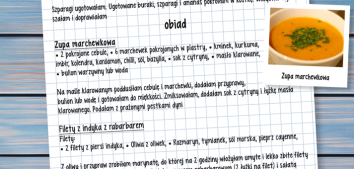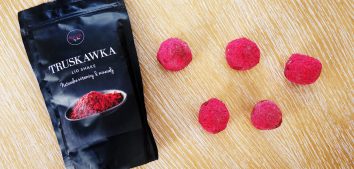
Insulin Resistance Diet
Insulin resistance is an increasingly common health problem in our society. In this post, you will find some practical tips on how to deal with insulin resistance on an everyday basis.
What is insulin resistance?
Insulin is a hormone produced by pancreatic β cells. The task of insulin is to regulate the level of glucose in the blood, but also to allow glucose to penetrate inside the cells. Insulin resistance is a condition characterized by a decrease in tissue sensitivity to insulin, which can occur with normal or elevated blood insulin. So far, no factors that cause this phenomenon have been identified. Genetic factors may play a role in the development of insulin resistance. Excessive body weight, poorly balanced diet, and low physical activity may also contribute to this condition.
Consequences of tissue resistance to insulin
Developing insulin resistance is accompanied not only by metabolic disorders, such as weight gain and disorders of lipid metabolism, but also many other conditions, e.g. diseases of the cardiovascular system. However, one of the most serious consequences of insulin resistance may be type 2 diabetes.
Treatment of insulin resistance
Apart from pharmacological treatment, an appropriately balanced diet is an extremely important part of insulin resistance therapy. Eating properly composed meals in combination with physical activity can significantly improve the sensitivity of tissues to insulin.
How can we deal with this problem?
You will find a few tips below that are worth following if you suffer from insulin resistance or would like to protect yourself from developing the condition in the future.
Choose a weight loss diet
There is no doubt that obesity is linked to insulin resistance. Following a weight loss diet and losing weight will improve tissue sensitivity to insulin. If you have a problem with excess weight, reduce the amount of calories you eat. Weight loss should be gradual and should amount to 0,5 – 1kg/week. Remember that too rapid weight loss may lead to the yo-yo effect.
Have regular meals
It is recommended that in the case of insulin resistance meals should be consumed more often and at the same time they should be smaller. The best choice will be 3-5 meals a day. It is also crucial to maintain adequate breaks between meals. Have breakfast within one hour of waking up and supper not later than 2-3 hours before bedtime.
Reduce the amount of simple sugars. Increase the intake of dietary fiber
Decreasing carbohydrate intake while increasing protein intake may reduce insulin secretion in patients with insulin resistance. When it comes to carbohydrates, it is best to choose those complex ones, which can be found in whole grains. You should also make sure to include more vegetables than fruit in your diet. Limit the intake of simple sugars contained in sweets, cakes, and cookies. At the same time, remember to choose products with a low glycemic index. Also, take care of proper intake of dietary fiber. Fiber improves intestinal function and prevents constipation, it also reduces insulin resistance and improves glucose metabolism.
Reduce fat intake – especially animal fats
On the one hand, it is known that combining fat and carbohydrates makes the increase of blood glucose as well as insulin lower and less rapid than after consuming only carbohydrates. On the other hand,high consumption of fats, especially animal fats, may promote weight gain. It is currently believed that if you suffer from insulin resistance, you should avoid animal fats that are rich in saturated fatty acids and cholesterol. Remember that nuts are a good source of fats. Studies have shown that consuming them may have a positive effect on reducing the development of insulin resistance. Don’t forget about fish. It is recommended that they should be eaten at least twice a week. Marine fish rich in polyunsaturated n-3 fatty acids with anti-inflammatory properties are especially recommended.
Slightly increase the amount of protein in your diet
Increasing protein intake promotes weight loss, and can also improve the sensitivity of tissues to insulin. It is recommended to eat wholesome protein, the source of which are products of animal origin, such as lean meat (poultry, rabbit or veal) and fish. Remember that eggs are also a good source of protein.
Don’t forget about vitamin D
Vitamin D deficiency is a risk factor for the development of insulin resistance. Research from recent years suggests that vitamin D may play an important role in the prevention of diabetes by reducing oxidative stress, improving the sensitivity of cells to insulin and pancreatic β-cell function. A good source of vitamin D is greasy sea fish. Do not forget to supplement this vitamin in the period from September to April.
Take care of the proper supply of zinc
Many studies have confirmed that zinc supplementation promotes glucose tolerance and reduces insulin resistance. The probable effect of zinc supplementation is associated with the reduction of oxidative stress. Remember that, among others, meat and whole grains are good sources of zinc.
Avoid highly processed food
Choose the most natural products, avoid high-processed foods and fast-food products. These products usually only provide a large amount of calories, while they are low in vitamins and minerals.
Choose only natural spices
Studies carried out so far have shown that cinnamon used in the diet affects the dynamics of carbohydrate metabolism and effectively reduces blood sugar in people with insulin resistance and type 2 diabetes. Ginseng, in turn, contains many bioactive compounds that influence both the stabilization of glucose level and blood pressure. A similar effect is shown by many other spices, e.g. ginger. That’s why you must make sure that natural spices stay in your kitchen for good.
Drink green tea
Green tea contains antioxidants which have anti-inflammatory, antibacterial and antioxidative properties. It has been shown that the green tea extract also affects the reduction of blood pressure, and the decrease in glucose levels.
Try white mulberry
Mulberry leaf extract can regulate carbohydrate metabolism. This is due to a large amount of quercetin present in the leaves of this plant. Apart from affecting glucose metabolism, mulberry extract also regulates the level of insulin in the blood, which is very important in the context of insulin resistance. The studies showed a significant improvement in insulin sensitivity after the use of white mulberry extracts.
Go for physical activity
Physical activity improves the sensitivity of cells to insulin and at the same time helps in the fight against obesity. Remember that the intensity of physical activity should be adjusted individually to your health. A moderate aerobic effort for 30 minutes at least 5 times a week is suitable for people with insulin resistance.
Insulin resistance can lead to serious health problems. Therefore, to prevent them today, make sure you have a proper diet. Weight loss, moderate physical activity and avoiding stress also improve the sensitivity of tissues to insulin.
Bibliography:
- Barazzoni R, Deutz NEP, Biolo G, Bischoff S, Boirie Y, Cederholm T, Cuerda C, Delzenne N, Leon Sanz M, Ljungqvist O, Muscaritoli M, Pichard C, Preiser JC, Sbraccia P, Singer P, Tappy L, Thorens B, Van Gossum A, Vettor R, Calder PC. Carbohydrates and insulin resistance in clinical nutrition: Recommendations from the ESPEN expert group. Clin Nutr. 2017;36(2):355-363.
- Esmaillzadeh A, Kimiagar M, Mehrabi Y, Azadbakht L, Hu FB, Willett WC. Dietary patterns, insulin resistance, and prevalence of the metabolic syndrome in women. Am J Clin Nutr. 2007;85(3):910-8.
- Ikeda K, Sato T, Nakayama T, Tanaka D, Nagashima K, Mano F, Joo E, Fujimoto S, Takahashi Y, Kosugi S, Sekine A, Tabara Y, Matsuda F, Inagaki N; Nagahama Study Group. Dietary habits associated with reduced insulin resistance: The Nagahama study. Diabetes Res Clin Pract. 2018;141:26-34.
- Isharwal S, Misra A, Wasir JS, Nigam P. Diet & insulin resistance: a review & Asian Indian perspective. Indian J Med Res. 2009;129(5):485-99.
- Misra A, Khurana L, Isharwal S, Bhardwaj S. South Asian diets and insulin resistance. Br J Nutr. 2009;101(4):465-73.











Comments 1 Comment
Join the discussion…
Very well prepared and eye opening article, thank you